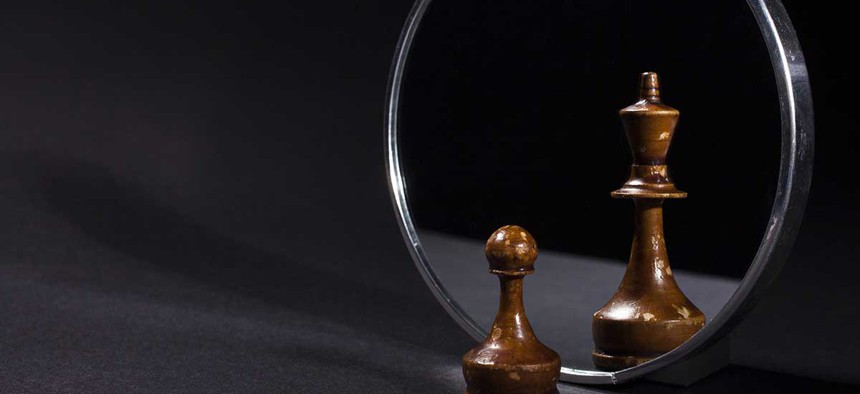
Nikolay Litov/Shutterstock.com
People Don't Actually Know Themselves Very Well
Chances are, your coworkers are better at rating some parts of your personality than you are.
When Donald Trump tweeted that he was a “very stable genius,” he was accused of lacking self-awareness by journalists and comedians. But the truth is that no one has perfect self-awareness—you probably believe more than a few things about yourself that are false.
Whether it’s in trying to land a job or impress a date, people spend a staggering amount of time making claims about themselves. It makes sense: You’re the only person on earth who has direct knowledge of every thought, feeling, and experience you’ve ever had. Who could possibly know you better than you? But your backstage access to your own mind sometimes makes you the last person on Earth others should trust about it. Think of it like owning a car: Just because you’ve driven it for years doesn’t mean you can pinpoint when and why the engine broke down.
Sixteen rigorous studies of thousands of people at work have shown that people’s coworkers are better than they are at recognizing how their personality will affect their job performance. As a social scientist, if I want to get a read on your personality, I could ask you to fill out a survey on how stable, dependable, friendly, outgoing, and curious you are. But I would be much better off asking your coworkers to rate you on those same traits: They’re up to 12 times more accurate. They can see things that you can’t or won’t—and these studies reveal that whatever you know about yourself that your coworkers don’t is basically irrelevant to your job performance.
Humans’ blind spots are predictable: There are certain types of traits where people can’t see themselves clearly, but others where they can. The psychologist Simine Vazire asked people to rate themselves and four friends on a bunch of traits, ranging from emotional stability and intelligence to creativity and assertiveness. Then, to see if they had predicted their own personalities better than their friends had, they took a bunch of tests that measured these traits.
The good news: You have some unique insight into your emotional stability. In the study, people outperformed their friends at predicting how anxious they’d look and sound when giving a speech about how they felt about their bodies. But they did no better than their friends (or than strangers who had met them just eight minutes earlier) at forecasting how assertive they’d be in a group discussion. And when they tried to predict their performance on an IQ test and a creativity test, they were less accurate than their friends.
People know themselves best on the traits that are tough to observe and easy to admit. Emotional stability is an internal state, so your friends don’t see it as vividly as you do. And although people might not want to call themselves unstable, the socially acceptable range is fairly wide, so we don’t tend to feel terribly anxious about being outed as having some anxiety. With more observable traits, we don’t have unique knowledge. If you’re a raging extrovert or a radical introvert, we don’t need to ask you—we can pick it up pretty quickly from your impromptu karaoke performances or your complaints that your husband types too loudly. And with the most evaluative traits, you just can’t be trusted. You probably want to convince everyone—and yourself—that you’re smart and creative.
This is why people consistently overestimate their intelligence, a pattern that seems to be more pronounced among men than women. It’s also why people overestimate their generosity: It’s a desirable trait. And it’s why people fall victim to my new favorite bias: the I’m-not-biased bias, where people tend to believethey have fewer biases than the average American. But you can’t judge whether you’re biased, because when it comes to yourself, you’re the most biased judge of all. And the more objective people think they are, the more they discriminate, because they don’t realize how vulnerable they are to bias.
Any time a trait is easy to observe or hard to admit, you need other people to hold up a mirror for you. Romantic partners and close friends might be more informed, because they’ve observed you more—but they can also have blurrier vision, because they chose you and often share that pesky desire to see you positively. You need people who are motivated to see you accurately. And I’ve come to believe that more often than not, those people are your colleagues. The people you work with closely have a vested interest in making you better (or at least less difficult). The challenge is they’re often reluctant to tell you the stuff you don’t want to hear, but need to hear.
Over the past few months, I’ve learned a lot about how to overcome those barriers. While recording a podcast, I invited myself into some unconventional workplaces. I was surprised that in each workplace, they made a it big priority to help people gain self-awareness—sometimes it was even part of their performance evaluations. And I walked away with new insights on how people can see themselves more clearly.
One: If you want people to really know you, weekly meetings don’t cut it. You need deep dives with them in high-intensity situations. When I talked with a crew of astronauts who went to the International Space Station together, I found out that nasa prepared them by sending them into the wilderness for 11 days together. Their guides promptly let them get lost, and they said they came out of that experience knowing each other better than colleagues they’d worked with for years. At Morning Star, a leading tomato-paste plant that has operated successfully for decades without a single boss, I was stunned to discover that the founder often interviews job applicants at their own homes for three to five hours.
Two: Looking under your own hood at what makes you tick and writing it down can provide a useful reference. I’ve seen a growing number of managers write their own user manuals to help people understand what brings out the best and worst in them. But it’s even better to have the people who know you well write your user manual for you. On a visit to the hedge fund Bridgewater Associates, I got to see people rate each other daily on up to 77 different dimensions. It sounds intense, but it forces people to be honest with themselves. And at Morning Star, employees get to write their own job descriptions based on how they plan to contribute to the company’s mission that year. But they have to get their closest colleagues to buy in on it, and then their coworkers rate their performance and determine their salary.
Three: Put yourself in situations where you can’t ignore feedback from multiple sources. In studies, one friend is only a little better at gauging a person’s intelligence and creativity than they themselves are; four friends are significantlybetter. When I infiltrated the writers’ room at The Daily Show, the host, Trevor Noah, told me he makes up 90 percent of his stand-up comedy on stage. He just starts riffing on topics and gets instant input on what’s funny from a whole crowd. And at Bridgewater, the ratings are weighted by how believable your colleagues have proven themselves to be in each domain. When five of your close colleagues have a track record of being highly organized and they all say you’re not, it’s tough to argue that you’re right and they’re wrong.
Imagine if the White House were organized this way. Presidents are rated all the time in public-opinion polls, but they’d learn a lot more if their own teams evaluated them. Since stability is an internal state, as long as he’s not clinically unstable, President Trump might be able to weigh in on it accurately. But he—like everyone—probably can’t see himself clearly when it comes to traits that are clearly desirable or undesirable, like intelligence.
The first rule of intelligence: Don’t talk about your intelligence. It’s something you prove, not something you claim. As comedian Patton Oswalt quipped about humor, the only person who goes around saying “I’m funny” is a not-funny person. If you were really funny, you’d just make people laugh.
So if I wanted to know how smart political candidates were, I wouldn’t bother with an IQ test. I’d just ask one question: How intelligent do you think you are?
The real geniuses will know it’s not their place to judge.







